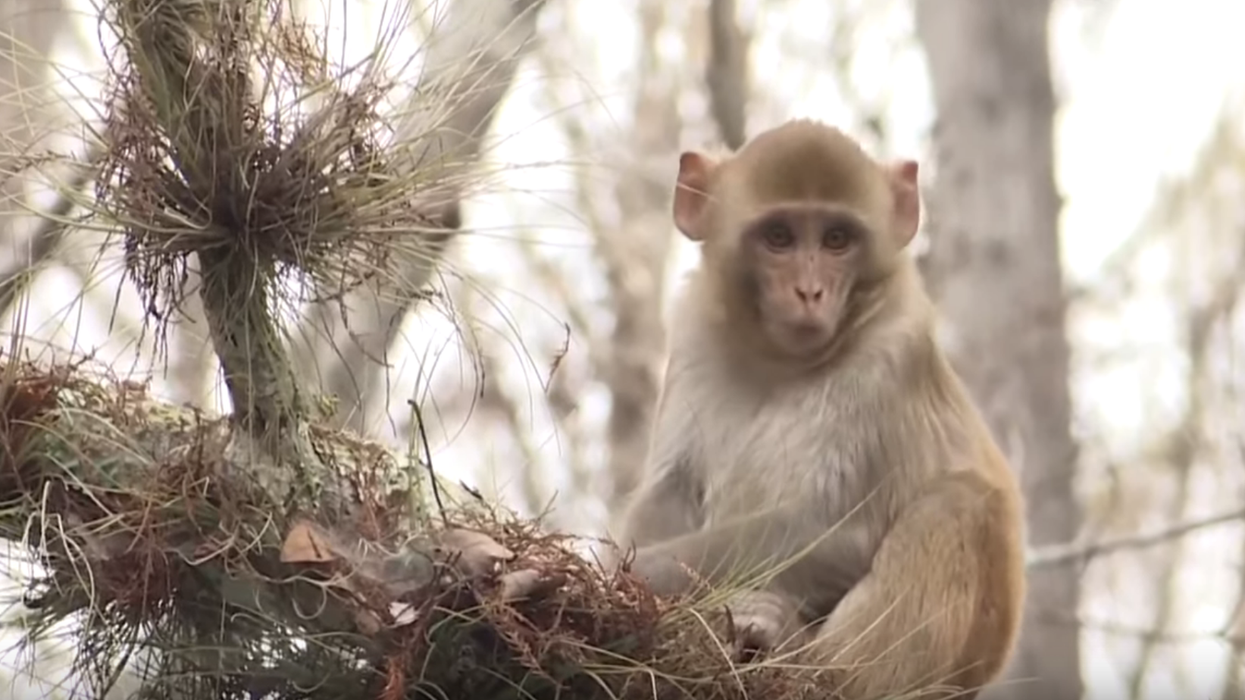
Screenshot | First Coast News/YouTube

'The potential ramifications are really dire'
Wild monkeys carrying a potentially fatal form of herpes virus have made their way into a new section of Florida, according to a local news report.
First Coast News — an NBC and ABC-affiliated station in northeast Florida— reported last week that there have been over a dozen sightings of rhesus macaques in Jacksonville-area neighborhoods over the past eight months.
Videos and photographs – grainy and shaky, shot by homeowners – track the trail of a species expansion that experts call concerning and possibly dangerous.
"The potential ramifications are really dire," University of Florida wildlife ecologist Dr. Steve Johnson told First Coast News. "A big male like the one in that video in Jacksonville -- that's an extremely strong, potentially dangerous animal."
First Coast News obtained two videos and several photographs taken of the monkeys. Florida Fish and Wildlife Conservation Commission (FWC) officials call the reports credible, a likely expansion of the feral monkey population in Central Florida.
The monkeys aren't at all native to Florida but rather a large portion of the Asian continent. According to the Orlando Sentinel, the invasive species was first introduced to central Florida's Silver Spring State Park in the 1930s by a river cruise attraction owner in an effort to draw in more tourists. He put them on an island in the Silver River, the newspaper explains; but as it turned out, they didn't have to stay on the island because they could swim and the population grew in woods nearby.
Since then, the've been spotted in different areas outside of the park, but First Coast News says this is the first time they've been seen in the northeast Florida "first coast" region.
In addition to the potential for primate-on-person violence, contact with the animals could prove dangerous — or even potentially deadly — for humans due to macaques' ability transmit the Herpes B virus.
"B virus infection is extremely rare, but it can lead to severe brain damage or death if you do not get treatment immediately," according to the Centers for Disease Control and Prevention. "People typically get infected with B virus if they are bitten or scratched by an infected macaque monkey, or have contact with the monkey's eyes, nose, or mouth."
2018 CDC numbers found that that up to 30 percent of Florida's macaques could be carrying the Herpes B virus.
But so far, none of the feral monkeys have infected anyone in the wild. The Florida Fish and Wildlife Conservation Commission says "No confirmed cases of a human contracting herpes B from a macaque in the wild have been documented, but fifty incidents of human infection contracted from macaques in captivity have been reported."
"I personally am concerned," Johnson told The Guardian about the possibility of human infection in December. "There's a low risk, but very high consequence should something happen. Fortunately nothing has happened yet, but I wouldn't want to have that looming over me if I was the state."